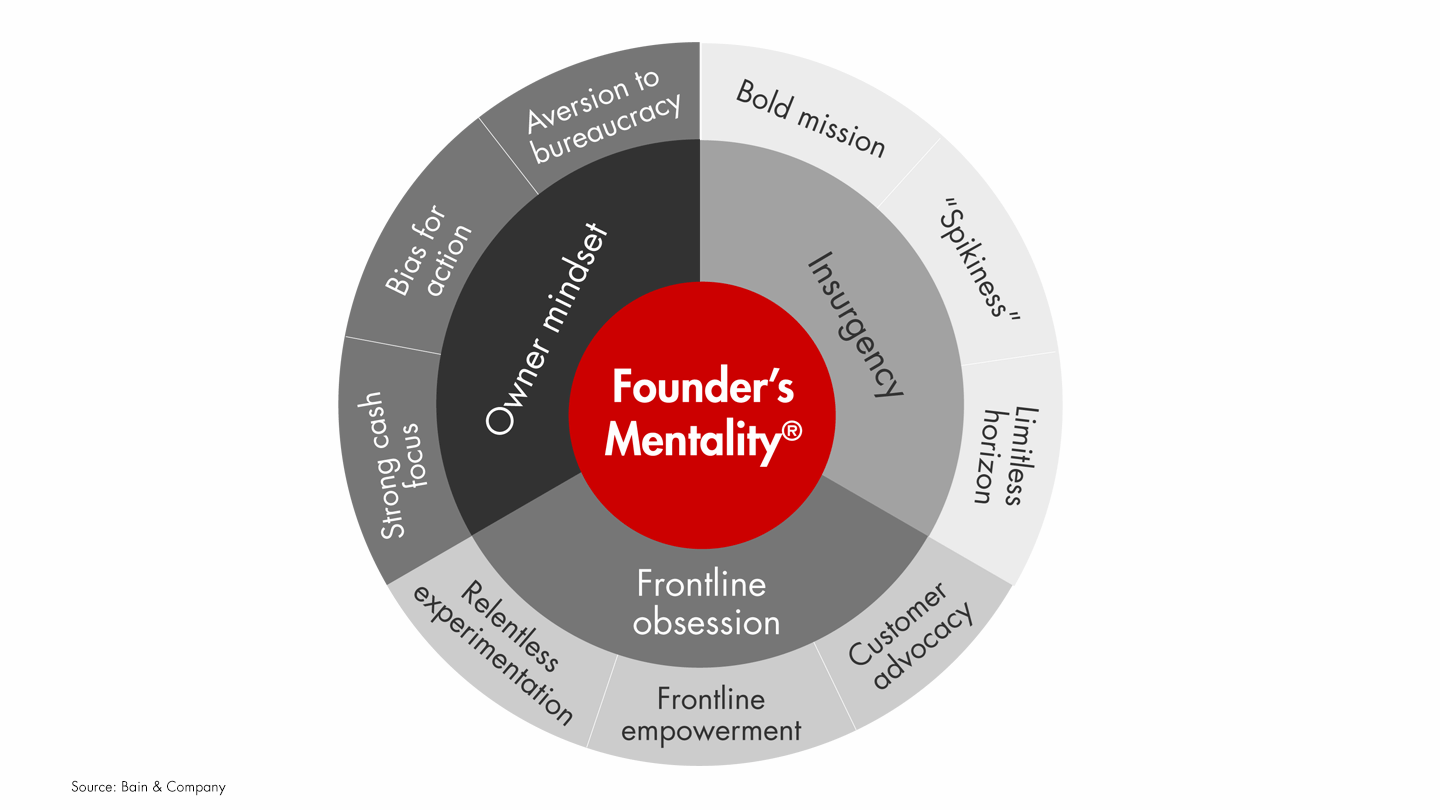Founder's Mentality Blog
As companies grow, one of the first casualties of the resulting complexity is the front line. But that doesn’t happen at companies with high Founder’s Mentality because one of their defining characteristics is a frontline obsession—along with an extraordinary sense of insurgency and an owner mindset (Figure 1).
The most sustainably profitable companies nurture and maintain three traits


Frontline obsession is evident in three ways at companies with high Founder’s Mentality:
- These companies constantly translate strategy and organizational decisions into frontline routines and behaviors in order to serve customers better and earn customer advocacy and loyalty.
- The leaders obsess about the key players in their organization who deliver the value to customers and ensure that these people are the “heroes.” Leaders do not allow organizational layers or complexity to distract them from this focus on the talent that really matters. Frontline empowerment is a top priority—these companies give their people the authority and resources they need to do what it takes to serve customers better.
- This leads to relentless experimentation—hundreds of experiments by customer-focused, empowered employees continually innovating and working with their customers to devise new solutions, better service and better products.

About the Founder's Mentality
The three elements of the Founder's Mentality help companies sustain performance while avoiding the inevitable crises of growth.
Let’s take a closer look at frontline empowerment, a key feature of frontline obsession.
Luiza Helena Trajano, president of MagazineLuiza, is a perfect example of a leader with Founder’s Mentality who remains obsessed with the front line as her company grows. MagazineLuiza is a leading retail brand in Brazil. With more than 740 stores and 23,000 employees, it serves a growing Brazilian middle-class seeking to furnish their first houses and apartments with furniture, electronics and other household products. Luiza’s aunt and uncle founded the current company in 1957, and her aunt worked there until five years ago. Luiza Helena began working in her aunt’s store when she was 12 and started running the company in 1991, when it had 30 stores.
Luiza is a larger-than-life personality and one of the most well-known business leaders in South America. One of her key roles at MagazineLuiza is championing the store manager and his or her staff. As the company increases in scale and adopts a more professional management structure, she is determined to keep the store as the unit of value creation, in which the store manager has all the power and information needed to serve local customers. She argues:
“I know we must continue to be more professional as we grow. That is important. But I also know that we must keep the store manager as ‘king’ or ‘queen’ of the company, with all of us working to serve their needs. Many forces work against this as we try to harmonize pricing, buying, etc. That’s why I have to remain the voice of the front line as decisions are made. We cannot lose focus on who’s the real boss: It is our store manager.”
Many CEOs now contend that to be customer focused, you actually have to put your employees first—by which they mean that unless the people you hold accountable to serve your customers feel they have all the tools and resources to do this, there is no point in putting the customer first. But the notion of frontline empowerment is far more profound—it signals the basic orientation of the firm.
Do leaders like Luiza Helena, the voice of the front line, hold themselves accountable for doing what it takes internally to ensure the kings and queens have what they need to support customers? Do the functional heads view their role to be supporting the front line, or do they—as happens all too often—think that the front line is there to execute on central tasks? Does the company reward the “doers” who make it happen every day for customers and treat those people as the heroes? Or does it reward the “thinkers” and allow execution to become devalued over time?